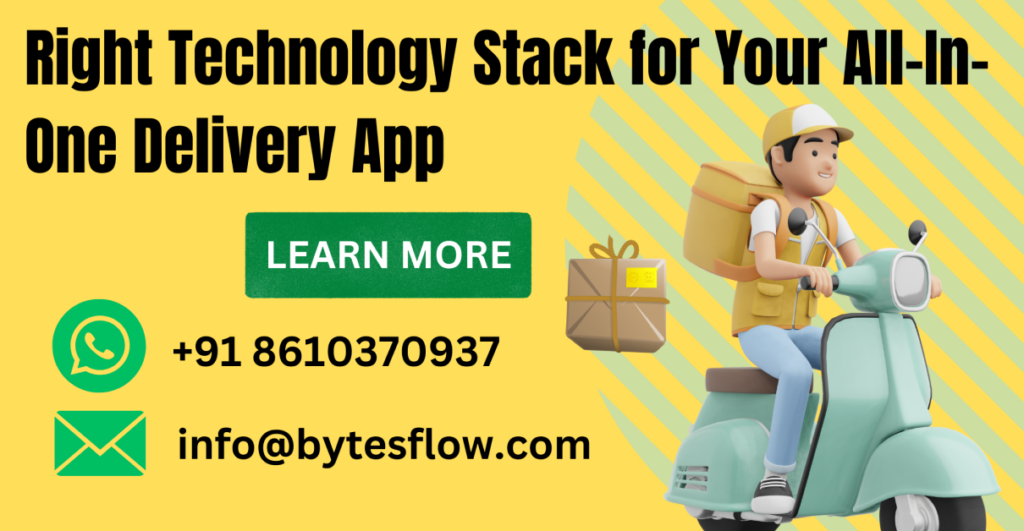All-in-one delivery applications have transformed how we order food, groceries, medicines, and even send parcels, all through a single platform. Giants like Glovo, Gojek, and Rappi have shown us the limitless possibilities of such super apps. But behind their smooth user experiences and massive success lies a carefully selected tech stack for all in one delivery app development.
If you intend to create an all-in-one delivery app, grasping the appropriate technologies is essential. Let’s dive into the essential technology stack components needed to build a scalable, secure, and feature-rich all in one delivery app script.
Essential Tech Stack for All In One Delivery App Development
1. Frontend Technologies (Customer, Driver, Merchant Apps)
The frontend tech stack for all in one delivery app development is what users interact with, so it needs to be fast, responsive, and intuitive.
Mobile Apps:
- Android: Kotlin, Java
- iOS: Swift, Objective-C
- Cross-Platform: Flutter, React Native (Ideal for faster development and cost-efficiency)
Web Apps (Admin Panel / Merchant Portal):
- HTML5, CSS3, JavaScript
- React.js or Vue.js for creating dynamic and responsive user interfaces
A smooth and fast interface keeps users engaged, reduces bounce rates, and improves retention.
2. Backend Technologies
The backend tech stack for all in one delivery app development powers all core functionalities like order management, real-time tracking, payments, and user authentication.
Programming Languages:
- Node.js (highly scalable, event-driven)
- Python (excellent for advanced functions and machine learning integration)
- Java or Ruby on Rails (for secure, robust solutions)
Frameworks:
- Express.js (Node.js)
- Django (Python)
- Spring Boot (Java)
Databases:
- SQL Database: PostgreSQL, MySQL (for structured data like user profiles, orders, etc.)
- NoSQL Database: MongoDB (for flexible data storage like app activity logs, user preferences)
A strong backend ensures your app handles millions of transactions, real-time updates, and user actions smoothly.
3. Real-Time Features
Real-time updates are essential for enabling delivery tracking, instant notifications, and seamless messaging.
Socket Programming:
- Socket.IO (Node.js) for real-time communication
Push Notifications:
- Firebase Cloud Messaging (FCM) for Android
- Apple Push Notification Service (APNS) for iOS
Real-Time Location Tracking:
- Google Maps API, Mapbox, or OpenStreetMap for GPS tracking and route optimization
Real-time interaction increases trust and engagement, improving customer satisfaction.
4. Payment Gateway Integration
A reliable and secure payment system is a must.
- Popular Payment Gateways: Stripe, PayPal, Razorpay, Braintree
- Regional Payment Integrations: Support for local wallets and COD (Cash on Delivery)
- Security Protocols: PCI-DSS Compliance, SSL encryption
Frictionless and secure payments enhance user experience and build credibility.
5. Cloud Infrastructure
Your app needs robust hosting to scale efficiently.
Cloud Platforms:
- AWS (Amazon Web Services)
- Google Cloud Platform (GCP)
- Microsoft Azure
- Key Services:
- Auto-scaling servers (AWS EC2, GCP Compute Engine)
- Cloud Storage (AWS S3)
- Load Balancers
- CDN (Content Delivery Network) for delivering content
Cloud solutions ensure your app can handle traffic spikes, secure data, and deliver content quickly anywhere in the world.
6. Admin Dashboard and Analytics
Overseeing an all in one delivery script demands a powerful and comprehensive admin panel.
Admin Dashboard Technologies:
- React.js, Angular for frontend
- Node.js, Django, or Laravel for backend
Analytics Tools:
- Google Analytics, Mixpanel, or Firebase Analytics
- Custom-built dashboards for real-time metrics (orders, deliveries, cancellations, etc.)
Effective management and data-driven decisions help optimize operations and scale the business.
7. APIs and Third-Party Integrations
Enhance app functionality through external APIs.
- SMS and Email APIs: Twilio, SendGrid, Mailgun
- Social Media Logins: Facebook, Google OAuth
- Chat Systems: Twilio, Sendbird, or Firebase Realtime Database
Pre-built integrations save development time and bring robust features to your app.
8. Security Measures
Security should be at the core of your anything delivery app development.
- Authentication: OAuth 2.0, JWT (JSON Web Tokens)
- Data Encryption: SSL/TLS
- Regular Penetration Testing
- GDPR, HIPAA, and other local compliance standards
Strong security builds trust, protects sensitive information, and prevents breaches.
Choose the Right Tech Stack for All In One Delivery App Development!
Building a successful all-in-one delivery app is not just about having a great idea. It’s also about bringing that idea to life using the right tech stack for all in one delivery app development. From seamless real-time interactions to secure payment processing and scalable infrastructure, every layer plays a vital role.
Choosing the right tech stack for all in one delivery app development ensures your app can grow, adapt, and thrive in a highly competitive market.
